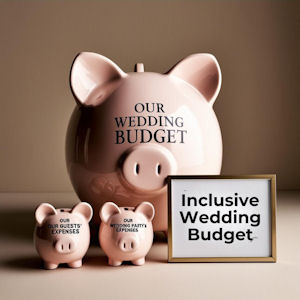How to Create an Inclusive Wedding Budget
/08
by Jennifer
Cram - Brisbane Marriage Celebrant © 22 November
2024Categories: | Inclusive Weddings | Wedding Budget| Wedding Planning |
 Planning
a wedding is thrilling, but it is also complex and
it can be tricky, particularly when it comes to
getting your budget right.
Planning
a wedding is thrilling, but it is also complex and
it can be tricky, particularly when it comes to
getting your budget right.The usual wedding budget advice focuses solely on the direct expenditure you, as the couple, will incur. An inclusive budget, on the other hand, considers not only your expenses but also the financial implications of your choices for your guests and wedding party.
Creating an inclusive wedding budget requires empathy and thoughtfulness but makes a big difference for your guests. By planning with inclusion in mind, you ensure your wedding is a celebration for everyone involved. Remember, your wedding is about love and community.
Here's how to create a considerate budget that reflects your values and ensures everyone can share in the joy of your special day.
What is an Inclusive
Wedding Budget?
Steps to Create an
Inclusive Budget
- Assess Your Guest List
Start by considering who you want to invite and their potential financial situations. This doesn't mean you need to pry into their personal finances but be mindful of the diversity in your guest list. For instance, if many guests are traveling from out of town, consider how their travel expenses might affect their ability to attend. - Location and Venue
Choose a venue that's accessible and affordable. Look for locations local to the majority of your guests with nearby budget-friendly accommodations to minimise travel costs for those who will be travelling - Offer Transportation and Accommodation
Options
If possible, provide transport from a central location. Share negotiated group rates at hotels to help guests save on accommodations.
- Dress Code
Be upfront about the dress code and consider choosing options that are economical. For example, suggest attire that your guests might already own or can easily rent. Consider covering attire costs for your wedding party or choosing a flexible colour scheme. - Create a Gift-Free Option
Emphasise that your guests' presence is the best gift. Offer non-monetary contribution options, like homemade goods or services. - Consider Meal Preferences
Catering is a significant part of any wedding budget, but it's also an area where inclusivity can shine. Offer a variety of meal options to accommodate dietary restrictions and preferences. This not only shows consideration but also ensures everyone can enjoy the celebration without additional financial strain. - Set Up a Wedding Fund
Establish a discreet fund for guests who might need financial help to attend, and privately offer to meet selected expenses for those guests.
Related Information
- Jennifer
Cram, The Inclusive Celebrant: My Commitment
to Diversity and Inclusion
- How to create an inclusive wedding registry
Thanks for reading!

pullin0 Things